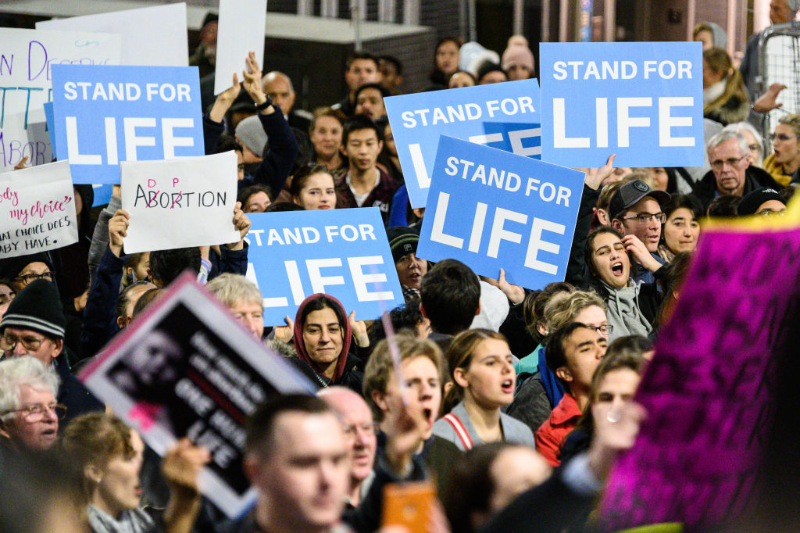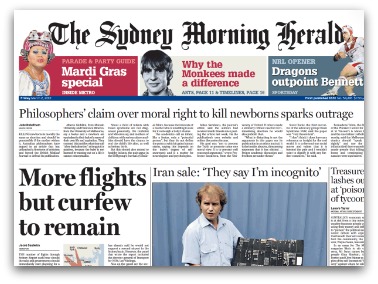Keywords: Victorian Abortion Legislation
-

AUSTRALIA
- Michael McVeigh
- 15 June 2022
6 Comments
One would assume that the Victorian Liberal Party has looked at the numbers, and believes that religious conservatives no longer make up a significant proportion of their constituency. Certainly, the moral authority of the Catholic Church and other Christian denominations has taken a battering in the state over the last decade, with many remaining openly hostile to religious perspectives. If the pro-life movement was ever a significant force in Australian politics, that’s no longer the case.
READ MORE 
-

AUSTRALIA
- Frank Brennan
- 15 September 2021
22 Comments
The Queensland parliament, like the Victorian parliament four years ago, is committed to legislating for voluntary assisted dying. The bill being considered by the one-chamber Queensland parliament this week basically follows the contours of the Victorian legislation. But there are three major developments proposed that are very worrying in this new field of social experimentation.
READ MORE 
-

RELIGION
- Andrew Hamilton
- 27 September 2017
6 Comments
Discussion of ageing is often confined to practical matters. Deeper questions of why older people matter and of what value a good society should put on them are either answered in slogans or not at all.
READ MORE 
-

RELIGION
- Frank Brennan
- 03 December 2015
The consideration of medico-legal problems in the public square of a pluralistic democratic society keeping pace with profound technological change is often marked by simplistic assertions, precluding considerations of comprehensive world views, whether religious or philosophical. It is now commonplace for doctors to be told to leave their consciences at the door, as their patients are consumers and they are suppliers and of course the market decides. Debates about law and policy are often resolved with simplistic assertions about individual rights and autonomy, with little consideration for the public interest, the common good, and the doctor-patient relationship. Even conscience is said to be a matter for contracting out. This evening I ask whether there are more compelling ways to resolve medico-legal dilemmas, while conceding a limited role for law in determining the range of acceptable answers.
READ MORE
-

RELIGION
- Frank Brennan
- 08 November 2013
1 Comment
'Many Catholics wonder how we can maintain our Christian faith at this time in the wake of the sexual abuse crisis and the many judgmental utterances about sexuality and reproduction. The Church that has spoken longest and loudest about sex in all its modalities seems to be one of the social institutions most needing to get its own house in order.' Frank Brennan's address to the Yarra Institute for Religion and Social Policy, 8 November 2013.
READ MORE
-

RELIGION
- Frank Brennan
- 18 March 2013
3 Comments
Change is upon the Church. Just recall the scene when the new pope emerged on the Vatican balcony. He appeared with none of the papal trimmings of office, and did not once did he refer to the papacy. Could something of this new papal style help Catholics engage more creatively with their fellow citizens? Text from Frank Brennan's lecture 'How Can the Catholic Church Contribute to a Better Culture for Life?'
READ MORE
-

RELIGION
- Frank Brennan
- 23 November 2012
1 Comment
'Might not the chief problem with Church language in the public square be that we tend to come from a position of moral superiority, approaching those dreadfully compromised politicians who will do anything to be elected? The abuse crisis reminds us that the Church is not irreproachable.' Text from Fr Frank Brennan's presentation at the Anglican Church of Australia's Public Affairs Commission Conference, November 2012.
READ MORE
-

RELIGION
- Frank Brennan
- 18 September 2012
'The common law leaves a gap between the mandates of the law and the conduct that we choose to engage in according to our individual moral standards. We call that gap 'freedom'. The challenge is determining the width of that gap for groups bound by religious faith which differs from the Australian majority.' Frank Brennan launches Carolyn Evans' Legal Protection of Religious Freedom in Australia. Full text
READ MORE
-

AUSTRALIA
- Michael Mullins
- 05 March 2012
25 Comments
It's alarming that two Melbourne academics are arguing for the legalisation of infanticide. It is worth recalling that in 1939 academic argument led to the Victorian Parliament legalising eugenics, of which infanticide is a form. Fortunately it was never practised due to embarrassment over the Holocaust.
READ MORE 
-

RELIGION
- Frank Brennan
- 30 January 2012
10 Comments
I have been feeling sad and confused about the happenings in Canberra since Australia Day. On Saturday I got on my bike and went down to the lawn of Old Parliament House. I passed a sign: 'You are now entering or leaving the Australian Aboriginal Tent Embassy ... Abusive behaviour will not be tolerated.'
READ MORE
-

RELIGION
- Frank Brennan
- 23 November 2011
Fr Frank Brennan SJ's address at the 'Ethics in a Multi Faith Society: Muslims and Christians in Dialogue' Conference, Conference under the auspices of the Fethullah Gulen Chair in the Study of Islam and Muslim-Catholic Relations, Australian Catholic University, Melbourne, 23 November 2011.
READ MORE
-

RELIGION
- Frank Brennan
- 02 August 2011
1 Comment
I am bemused that whenever I agitate questions of Aboriginal and refugee rights I am well received by liberals, who then question my clerical entitlement to speak when I buy into debates on issues like euthanasia and embryonic stem cell research. On same sex marriage, I am attacked from both sides.
READ MORE